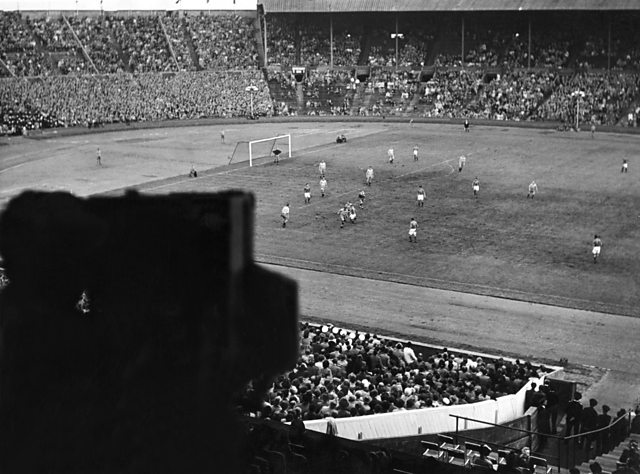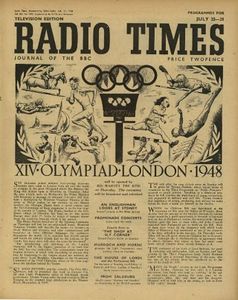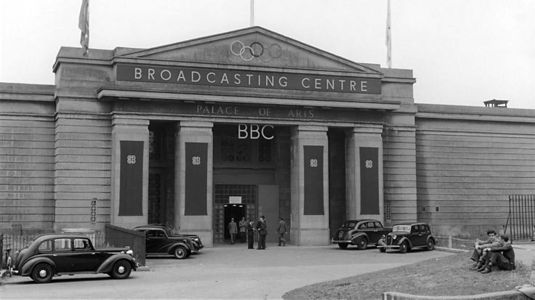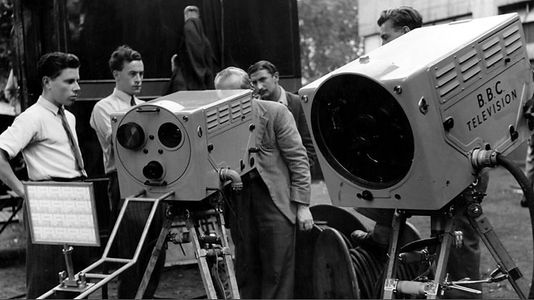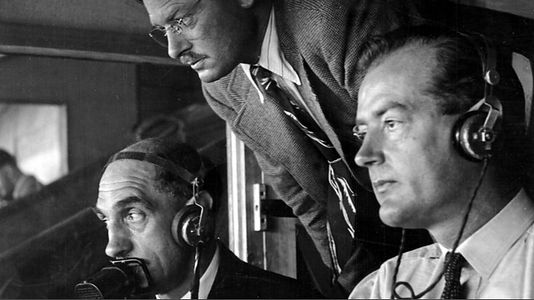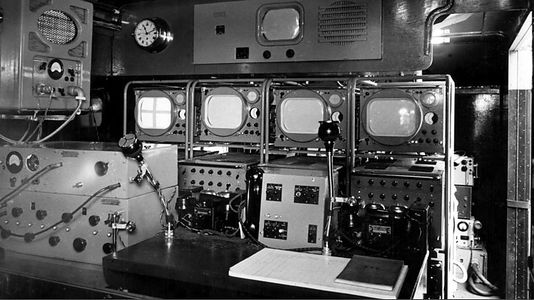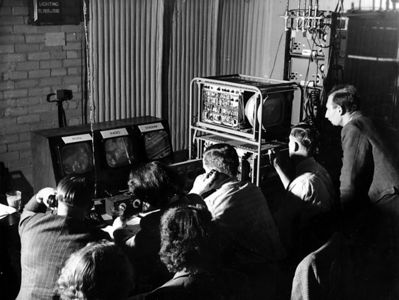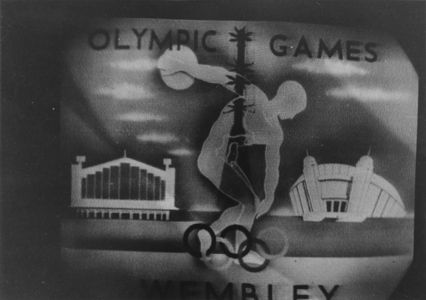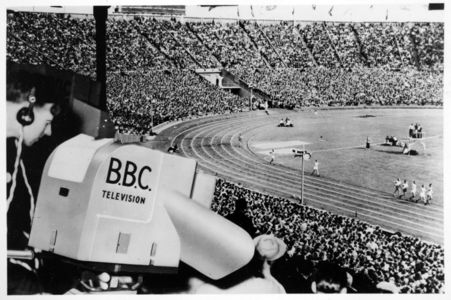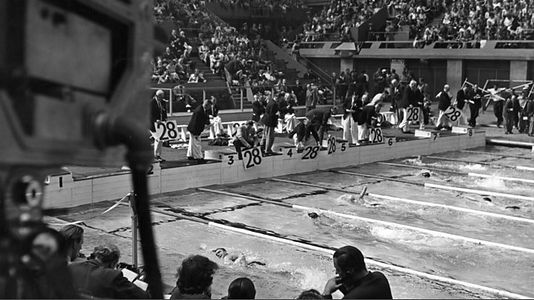1948 Summer Olympics (partially found television coverage of London Games; 1948)
BBC Television camera capturing footage of the Sweden-Yugoslavia football match.
Status: Partially Found
The 1948 Summer Olympics was the eleventh edition of the modern Summer Games, which was held from 29th July to 14th August in London, England. Nicknamed the "Austerity Games" due to financial limitations and rationing needs caused following the aftermath of the Second World War, it is most famous for Fanny Blankers-Koen winning four gold medals and Bob Mathias becoming the youngest male to ever win an Olympics track and field gold medal. From a television perspective, this was the first Summer Olympics to be televised by the BBC.
Background
Following the end of World War 2, London successfully bid to host the first Summer Olympics since 1936, beating out other candidates like Los Angeles and Lausanne.[1][2] The financial impact of the War led to a tight budget, with the Games being nicknamed the "Austerity Games".[1][2] Notably, all venues utilised like Empire Stadium and Empire Pool already existed before London won the bid, with the Olympics' operations costing only £730,000, around £18.5 million in today's money.[3][1] Rations for both food and clothing were still in effect, although athletes were allocated more than double the food rations daily compared to British citizens.[1]
Despite the financial constraints, the 1948 Summer Olympics proved successful, helping the United Kingdom rebuild following the War.[1][2][4] Netherlands' Fanny Blankers-Koen achieved the most success at the Games, "The Flying Housewife" surprising onlookers who thought she was too old to compete by earning four gold medals in the 100m, 200m, 80m high hurdles and the 4x100m relay.[1][3][4] Meanwhile, United States athlete Bob Mathias won a gold medal in decathlon, where aged 17 he became the youngest man to win a track and field event at the Olympics.[1] Additionally, United States' Alice Coachman became the first African American to win a gold medal, doing so in the high jump.[1]
BBC Coverage
Meanwhile, the BBC was seeking means of increasing television's popularity in the UK, having resumed transmissions on 7th June 1946.[5][6][2] It had found attracting new viewers difficult, with only 15,000 TV licences being purchased, exclusively within the London area as broadcasts were limited to that region.[2][1] Therefore, the organisation decided to bid £1,000 to televise the Games for the first time to attract new viewership, which is just over £25,000 in today's money.[3][1][2][7] The corporation was successful, and so it began to invest heavily in ensuring strong coverage.[3][6][2][7] Its first move was to establish the first International Broadcasting Centre for both radio and television within the Palace of Arts at Wembley.[3][2][6] Here, the centre contained 16 studios, two TV control rooms, 350 engineers, 200 reporters from across the world and 200 support staff.[6][3][4] Additionally, two mobile control units, one situated at Empire Stadium, the other at Empire Pool, operated several cameras, which all relayed back to the radio control centre.[6][2][7][4]
The BBC also harnessed information on how Germany televised the 1936 Berlin Games, the first Summer Olympics to receive live television coverage.[6][2][3] It was clear that, just like the televising of the Berlin Games, cutting-edge technology was required.[2][6] Thus, the CPS Emitron camera was utilised; its portability, ability to produce consistent high-quality pictures, and the incorporation of an electronic viewfinder that enabled the director to view the same images being transmitted simultaneously, made it the pride of BBC.[2][6] Additionally, the three turret lenses could be adjusted to different focal lengths, which meant that rather than being restricted to capturing just three different views of the action, it enabled the camera to transmit nine.[2][6]
In total, around 68.5 hours of live television coverage was provided to up to 100,000 households with televisions sets, averaging about five hours per day.[6][3][2][4] The BBC narrowly missed out on breaking the world record for the longest uninterrupted television broadcast when it transmitted 7.5 hours of content in one day, only to be informed that a US Congress broadcast was slightly longer.[2] Nevertheless, BBC Television Service's coverage boosted its reputation, and lessons learned from the Games also proved critical in the BBC's broadcast of Queen Elizabeth II's coronation on 2nd June 1953, which further enhanced its image and generated a significantly increased television viewership.[6][2] Post-Games, Head of Programmes Cecil McGivern wrote the following letter to BBC Television Centre staff: "There is no doubt at all that our televising of the XIV Olympiad has been a very great success and has brought considerable credit to British television both in this country and abroad."[8]
Football
BBC Television Service showcased a diverse range of sports, with track and field events, show jumping, swimming and diving all receiving coverage thanks to OB vans being present at both Empire Stadium and Empire Pool.[7][6][3][2] Football also received its fair share of coverage, becoming the first major football tournament to be televised in Britain.[8] Additionally, more BBC history was made outside the Olympics.[8] Prior to the London Games, the BBC had exclusively televised football matches featuring at least one team from the British Isles.[8] Great Britain competed in the event, eventually placing fourth.[8] However, the BBC would obviously be expected to televise matches beyond just those featuring the UK team.[8]
Thus, on 10th August 1948, history was made when Sweden faced Denmark in the first semi-final, the first BBC televised match between two teams outside the British Isles.[8] The fact coverage began at 6:30 also meant it was the first evening match to receive coverage, the CPS Emitron cameras being able to capture quality footage past sunset.[8][2][6] The BBC would later broadcast Yugoslavia's win over Great Britain in the second semi-final.[8] On 13th August, Great Britain and Denmark competed for bronze, while Yugoslavia and Sweden battled for the gold.[8] Both matches were fully televised live, the first instance where two matches were broadcast live in-full on the same day.[8] Denmark beat Great Britain 5-3 to win bronze, while Sweden won gold after defeating Yugoslavia 3-1.[9][8]
Availability
Ultimately, all television footage of the London Games was transmitted live.[10][6][3][8] Prior to 1956, recording television proved limited, as video tape had not yet been perfected, nor utilised by the BBC.[6][10][8] Tele-recording, the process of placing a film camera in front of a flat television screen, was the only means available of recording television, but even this was done on a limited basis.[6][10][8] Thus, almost all of the television coverage is permanently missing, outside of a few minutes of the Opening Ceremony, which was shown on television in a 1982 BBC documentary.[3][6][10][8]
Gallery
Videos
Images
See Also
Early BBC Sports Television
- 1931 Epsom Derby (lost televised footage of horse racing event; 1931)
- 1937 International Imperial Trophy Race (lost footage of motor race; 1937)
- 1937 Wimbledon Championships (partially found footage of tennis tournament; 1937)
- 1938 Ashes Series (partially found footage of international test cricket match; 1938)
- 1953 British Grand Prix (partially found footage of Formula One race; 1953)
- Archery (lost early televised toxophily; 1937-1938)
- The Boat Race 1938 (partially found footage of rowing race; 1938)
- Catch-As-Catch-Can Wrestling (lost early BBC televised professional wrestling matches; 1938-1939; 1946-1947)
- Darts and Shove Ha'penny (lost early BBC televised darts matches; 1936-1939)
- England 16-21 Scotland (partially found footage of rugby match; 1938)
- Horace Lindrum vs Willie Smith (lost footage of televised snooker; 1937)
- Woods and Jack (lost early televised lawn bowls; 1937; 1946)
Early Sports Television Media
- 1934 Philo T. Farnsworth broadcasts (lost early television demonstrations; 1934)
- 1936 Summer Olympics (lost television coverage of Berlin Games; 1936)
- 1938 Pennsylvania Quakers football season (lost early televised college football games; 1938)
- 1960 Daytona Races (lost CBS and NBC televised footage of NASCAR prelude events to Daytona 500; 1960)
- 1962 Trenton 100 (lost footage of USAC Championship Car Season race; 1962)
- Bill Longson vs Whipper Billy Watson (lost footage of professional wrestling match; 1947)
- Brooklyn Dodgers 2-5 6-1 Cincinnati Reds (lost footage of MLB doubleheader; 1939)
- Brooklyn Dodgers 23-14 Philadelphia Eagles (lost footage of NFL game; 1939)
- Columbia Lions 1-2 Princeton Tigers (partially found footage of college baseball game; 1939)
- Fordham Rams 34-7 Waynesburg Yellow Jackets (lost footage of college football game; 1939)
- Indianapolis 500 WFBM-TV Broadcasts (lost racing footage; 1949-1950)
Football Media
- 1937 FA Cup Final (partially found footage of football match; 1937)
- 1938 FA Cup Final (partially found footage of football match; 1938)
- 1939 FA Cup Final (partially found footage of football match; 1939)
- 1947 FA Cup Final (partially found footage of football match; 1947)
- 1948 FA Cup Final (partially found footage of football match; 1948)
- 1949 FA Cup Final (partially found footage of football match; 1949)
- 1955 Scottish Cup Final (partially found footage of football match; 1955)
- 1966 FIFA World Cup Final (partially found original colour film of international football match; 1966)
- 1971 WFA Cup Final (partially found footage of football match; 1971)
- 1976 WFA Cup Final (partially found footage of football match; 1976)
- 1977 WFA Cup Final (lost footage of football match; 1977)
- 1978 WFA Cup Final (lost footage of football match; 1978)
- 1979 WFA Cup Final (lost footage of football match; 1979)
- 1985-1986 WFA Cup (lost list of entries for football tournament; 1985)
- Arsenal 1-1 Sheffield United (lost radio commentary of football match; 1927)
- Arsenal 7-1 Hibernian (lost footage of charity football match; 1952)
- Arsenal vs Arsenal Reserves (lost footage of early BBC televised football match; 1937)
- Atlético Madrid 1-1 Real Madrid (lost footage of El Derbi Madrileño La Liga football match; 1958)
- Barbados 4–2 Grenada (partially found soccer match footage; 1994)
- Barnet 3-2 Wealdstone (lost footage of Athenian League football match; 1946)
- Brian Clough's Football Fortunes (lost DOS port of football management game; 1987)
- Charlton Athletic 1-0 Blackburn Rovers (lost footage of FA Cup match; 1947)
- England 0-1 Scotland (partially found footage of international football match; 1938)
- England 1-0 Scotland (lost footage of Schools' International football match; 1952)
- England 1-1 Scotland (partially found footage of international football match; 1947)
- England 1-3 Scotland (partially found footage of international football match; 1949)
- England 2-0 Italy (partially found footage of international football match; 1949)
- England 3-0 France (partially found footage of international football match; 1947)
- England 3-0 Rest of Europe (partially found footage of international football match; 1938)
- England 6-0 Switzerland (partially found footage of international football match; 1948)
- Falkirk 3-2 Newcastle United (lost footage of football match; 1953)
- FIFA Soccer 2002 (lost build of cancelled Game Boy Advance port of football game; existence unconfirmed; 2001-2002)
- Hallo! Bundesliga (lost GolTV series; mid 2000s-mid 2010s)
- Juventus 1-7 A.C. Milan (partially found footage of Serie A football match; 1950)
- Real Madrid 1-0 Barcelona (partially found footage of El Clásico La Liga football match; 1959)
- Real Madrid 3-0 Racing Santander (lost footage of La Liga football match; 1954)
- Scottish Universities 1-1 English Universities (lost footage of international football match; 1952)
- Serbia vs Albania (found footage of abandoned UEFA Euro 2016 qualifying match; 2014)
- United! (lost British soap opera; 1965-1967)
- Walthamstow Avenue 0-2 Queen's Park (lost footage of friendly football match; 1951)
Early BBC Television
- Alexandra Palace's wartime television demonstrations (lost footage of private television transmissions; 1943, 1945)
- An Inspector Calls (lost television adaptation of play; 1948)
- Ann and Harold (lost early BBC drama television series; 1938)
- BBC Election Night (lost coverage of British general elections; 1950-1951)
- The Care of Your Car (lost early BBC motoring show; 1947)
- Clothes-Line (lost early BBC fashion talk show; 1937-1938)
- Cook's Night Out (lost early BBC cooking show; 1937)
- Craftsmen at Work (lost early BBC documentary show; 1938, 1946)
- Dish of the Month (lost early BBC cooking show; 1937)
- First Aid (lost early BBC medical show; 1937)
- Foundations of Cookery (lost early BBC cooking show; 1939)
- The Man with the Flower in His Mouth (lost early BBC television drama; 1930)
- Marcel Boulestin television shorts (lost early BBC programs; 1937-1939)
- Masks through the Ages (lost early BBC history talk show; 1937)
- Opening of the BBC Television Service (partially found coverage of inaugural day of high-definition television service; 1936)
- The Orchestra and its Instruments (lost early BBC music talk show; 1937)
- RCA recording of BBC Television Service (found footage of pre-Second World War BBC television broadcast; 1938)
- Sea Stories (lost early BBC talk show; 1936-1937)
- Spelling Bee (lost early BBC game show; 1938)
- Telecrime (lost early BBC crime drama; 1938-1939; 1946)
- The Wasp's Nest (lost early BBC television adaptation of Agatha Christie short story; 1937)
- Weaponless Self-Defence (lost early ju-jitsu television program; 1936-1937)
- The World of Women (lost early BBC talk show; 1937)
References
- ↑ 1.0 1.1 1.2 1.3 1.4 1.5 1.6 1.7 1.8 1.9 History detailing the London Games itself, including how it earned the nickname the "Austerity Games" and notable event highlights. Retrieved 19 Jul '22
- ↑ 2.00 2.01 2.02 2.03 2.04 2.05 2.06 2.07 2.08 2.09 2.10 2.11 2.12 2.13 2.14 2.15 2.16 2.17 Science and Media Museum detailing the technology used in televising the 1936 and 1948 Summer Olympics. Retrieved 19 Jul '22
- ↑ 3.00 3.01 3.02 3.03 3.04 3.05 3.06 3.07 3.08 3.09 3.10 RTS London detailing the extent of BBC coverage and its broadcasting centre used to transmit the Games. Retrieved 19 Jul '22
- ↑ 4.0 4.1 4.2 4.3 4.4 BBC summarising how it televised its first Summer Olympics. Retrieved 19 Jul '22
- ↑ BBC detailing its resumption of television on 7th June 1946. Retrieved 19 Jul '22
- ↑ 6.00 6.01 6.02 6.03 6.04 6.05 6.06 6.07 6.08 6.09 6.10 6.11 6.12 6.13 6.14 6.15 6.16 BBC detailing the facilities, technology, and techniques it needed to televise the Games. Retrieved 19 Jul '22
- ↑ 7.0 7.1 7.2 7.3 Television Sports Production summarising how the BBC televised a diverse range of events. Retrieved 19 Jul '22
- ↑ 8.00 8.01 8.02 8.03 8.04 8.05 8.06 8.07 8.08 8.09 8.10 8.11 8.12 8.13 8.14 8.15 BBC detailing the history made from televising football at the 1948 London Games. Retrieved 19 Jul '22
- ↑ FIFA providing the results of the 1948 Summer Olympics football tournament. Retrieved 19 Jul '22
- ↑ 10.0 10.1 10.2 10.3 BBC detailing the surviving television footage of the 1948 Summer Olympics. Retrieved 19 Jul '22
